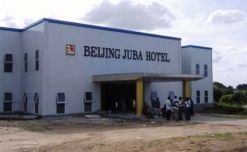South Sudanese complain of “get-rich-quick” schemes
August 21, 2007 (JUBA, Sudan) — The Beijing Juba Hotel may have a glamorous ring to it, but for the people of south Sudan’s capital the prefabricated hotel is another example of a “get-rich-quick” scheme ruining their economy.
 Juba, with little infrastructure and only one tarmac road, became capital of semi-autonomous south Sudan following a 2005 north-south peace deal that ended decades of civil war in the oil-producing nation.
Juba, with little infrastructure and only one tarmac road, became capital of semi-autonomous south Sudan following a 2005 north-south peace deal that ended decades of civil war in the oil-producing nation.
The town has since attracted thousands of individuals and companies looking for lucrative government contracts for the underdeveloped region and to provide services for those with larger salaries — aid workers, business people and politicians.
Restaurants and Internet cafes have all opened to cater for the wealthier expatriates with money to spend.
Accommodation in the capital is so scarce that people pay upwards of $100 a night to sleep in a tent. The few structures already built were renovated and taken over by the newly formed government.
But Juba’s average citizens are starting to complain the tented camps and prefabricated buildings are of little lasting value to the community. They are often run by east African businessmen, who pay no taxes and take profits out of the region.
WOOING CHINA
Materials for new buildings are hard to come by in the landlocked and heavily mined south.
Blurred lines of land ownership after millions were displaced during the war have also hampered construction. And political instability means investors are reluctant to put large amounts of money down.
So the southern government has been wooing China, which had invested in the northern-dominated oil industry despite political uncertainties.
South Sudan President Salva Kiir visited Beijing to boost economic relations with China last month. A deal to set up the prefabricated Beijing Juba Hotel, funded by Chinese investors, had already been struck by then.
The investors say that the deal will benefit both sides.
“After five years all the hotel will belong to the government,” said Guanghua Lee, its managing director, who explained that the land had been given free to the investors.
Another member of the management said they saw the handover as a kind of donation to the developing nation.
Fake gold pillars adorn the entrance under giant painted polystyrene BEIJING JUBA HOTEL lettering.
The venture will be more than just a $200-$250 a night hotel. It will also have restaurants, a conference room and entertainment facilities.
INVESTOR FEARS
But many in Juba are unhappy that China seems to have jumped on the bandwagon.
“We don’t need these temporary structures,” said one civil servant about the hotel that sits in its 50,000 square metres of prime land in the middle of town.
“We need real companies that will invest long term.”
Analysts warn the peace deal is shaky with people seeing little peace dividend and key oil areas as yet undefined. That and ongoing tribal violence has scared investors off.
“They (investors) may think one day war may come again, as you can see now there are problems with implementing the (peace deal),” noted Caesarina Hilary Wani, a director in the state ministry of finance.
She said it was a vicious circle.
“They want to make quick money because they are worried about the future security here,” she said. “But it is investment that leads to better security.”
(Reuters)
